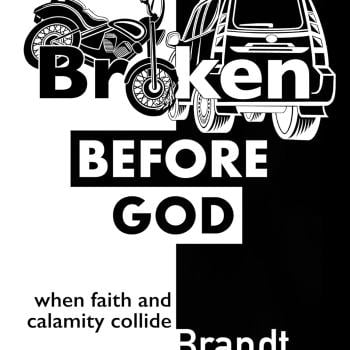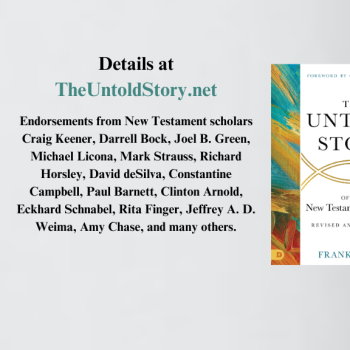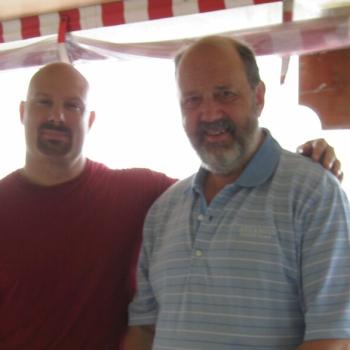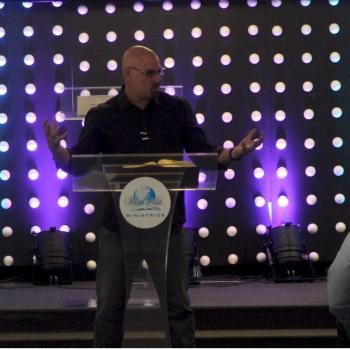If you’ve been reading this blog, you know that I review lots of books. I always look for the positive in every book, so until today, I’ve never written a negative review.
Today is the exception.
Occupy Spirituality is a new book by Adam Bucko and Matthew Fox.
The sub is “A Radical Vision for a New Generation.”
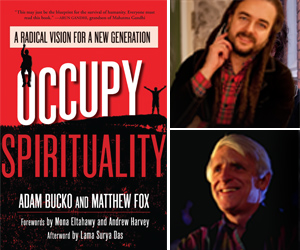
I thought the title and the sub – especially – gave promise for a great book. However, when I read it, well, I couldn’t resonate with virtually all of it.
The only thing I took away that I thought was valuable was that there should be tolerance in dialoguing with other faiths, even if we might disagree with them. I’m all for this and I think it’s necessary.
The reason why I had trouble with the majority of the book is because of what I believe about Jesus of Nazareth and the New Testament.
You see, I’m a follower of Jesus Christ and I, like N.T. Wright, F.F. Bruce, and C.S. Lewis, believe that the New Testament is accurate and reliable.
Thus, as I’ve articulated in Jesus Manifesto, I believe Jesus is Divine. He’s both God and man. I also believe He is the ONLY begotten Son of God, the ONLY Messiah, the Christ, and the ONLY rightful Lord of this world. I also believe that Jesus is who He said He was, the Way, the Truth, and the Life. “No man comes to the Father but by Him.”
“There is no other name under heaven given among humans whereby people must be saved.”
Spirituality, as defined by the New Testament, refers to a person who is walking in the Spirit of Jesus Christ. Those who repent and trust in Christ receive His Spirit and are regenerated (born from above). Regeneration doesn’t happen automatically and it doesn’t happen to every human being. Repentance and faith are required. In regeneration, Jesus Christ by the Holy Spirit indwells a human being. This truth is found in both Jesus and Paul.
Unfortunately, the version of spirituality that the authors promote in Occupy Spirituality is not rooted in what I’ve articulated above. Thus it doesn’t line up with orthodox Christianity nor with the witness of the New Testament.
Here’s just one quote to give you an idea of the perspective of the book:
“There’s never been a Christ or a Buddha like you.”
Statements like that are peppered throughout the book. You are Christ. Christ is in everyone. You are Buddha.
Christ and Buddha are set up as equals throughout the book … Christianity and Islam are equally valid.
Sigh.
The book is essentially a blending of Buddhist ideas and practices, Muslim ideas and practices, and Christian ideas and practices.
While such syncretism appeals to the natural mind and to post-modern sensibilities, it doesn’t square with the teachings of Jesus or Paul.
To go deeper, I believe the book gives an inaccurate picture of what true spirituality is for the following reasons:
1. Unlike all other faiths, original Christianity is based entirely on a Person.
Every religion is based upon the teachings or the philosophy of its founder. Not so with Christianity. Biblical Christianity is based on the Person of Jesus and not simply His teachings.
Remove Jesus, and there is nothing left to Christianity whatsoever. The entire faith is based on Christ’s incomparable life, His death, His resurrection, His ascension, His present work on the earth through His Spirit, and His second coming.
Buddhism is not based on the life or death of Buddha. It is based on his teachings. Remove Buddha and Buddhism still survives.
In the same way, Islam stands apart from Muhammad. It is rather built on his teachings. The same with Confucianism. Only Christianity is built on a Person and not on a teaching or philosophy. (Len Sweet and I expand this point in Jesus Manifesto.)
In addition, the effect that Jesus had on people . . . both when He was on earth as well as today . . . has no peer.
When people confronted Jesus, one of the three things happened: They either hated Him, were threatened by Him, or they adored Him.
With Jesus, there was and is no middle ground. This is the mark of a unique Person.
2. All other religions point to Jesus, while Jesus pointed to Himself.
Most of the major religions speak highly of Jesus and point to Him as a “way” to find God. Islam says He was a great prophet. Buddhism says He was a great teacher. Humanism says He was a great moral philosopher. The Mind Science religions say He was a spiritual mystic of the highest order. Even certain segments of Judaism say He was a great rabbi or prophet.
But what did Jesus say about Himself?
Jesus said He was the very Son of God and the only way to God. His exact words were: “I am the way, the truth, and the life; no one comes to the Father [God] except by Me.”
Every religion points an arrow to Jesus. (Jesus even gets mentioned by Satanists, but that religion makes Him the only enemy.)
So if I follow all the religions of the world, they will all point me to Jesus. But if I go and listen to what Jesus said about Himself, HE POINTS ALL THE ARROWS TO HIMSELF.
So to my mind, every religion confirms that Jesus of Nazareth is who He said He was – the Messiah, the Son of God, the only way to salvation.
Let me put a finer point on it by referring to C.S. Lewis’ famous trilemma. When it comes to the startling claims of Jesus . . . that He is the Son of God, sent by God to save the world . . . we only have three options.
- He was either a madman who was under a delusion of grandeur.
- He was a bold-face liar who deliberately deceived others.
- He was who He said He was . . . the Son of God and the Lord and Savior of the world.
Since all the major religions deny that Jesus was a madman or a liar, they (by their own testimony) show that He was in fact who He claimed to be. For how can a good man be a liar? And how can a man who has had such a positive influence on the world for centuries be a madman?
3. Jesus Christ has had more impact on the world than any other person.
The major holidays of the Western world are based upon the birth of Jesus Christ (Christmas) and upon His resurrection (Easter). Even the dating system that is used most widely in the world is based upon the person of Jesus. Jesus splits history into BC and AD.
(BC means “before Christ” and AD means “anno domini” . . . Latin for “in the year of our Lord.” )
As Jaroslav Pelikan once observed, “If it were possible, with some sort of super magnet, to pull up out of the history every scrap of metal bearing at least a trace of his name, how much would be left?” The answer: Not a whole lot.
The testimony of history, therefore, as well as the religions of the world, point to the truth that Jesus is who He claimed to be.
The Messiah, the Lord of the world, the Way, the Truth, and the Life.
This post is part of the sponsored Patheos Book Club.








